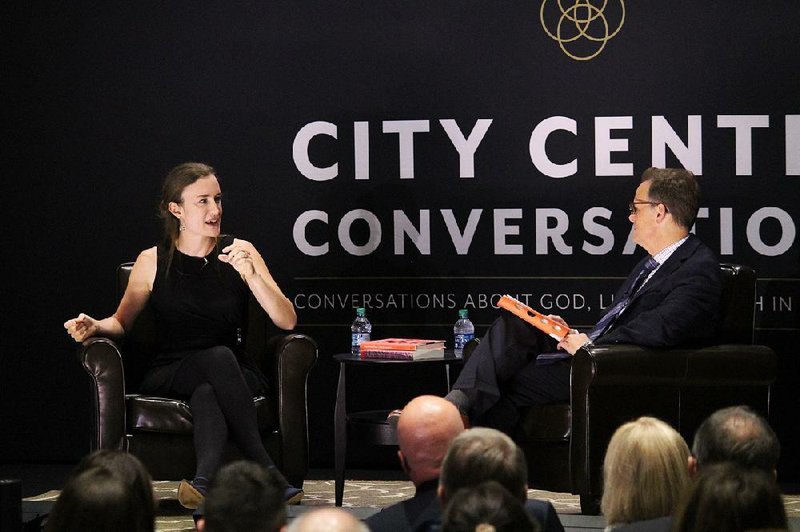Christians should be intellectually curious and unafraid to ask or answer questions about the harder issues of the Christian faith, an author and London native told a packed audience Tuesday at Robinson Center Performance Hall in Little Rock.
Dr. Rebecca McLaughlin's first book, Confronting Christianity: 12 Hard Questions for the World's Largest Religion, addresses controversial concerns about and objections to the faith. She spoke at the most recent installment of "City Center Conversations: Conversations About God, Life and Faith in the City," hosted by Little Rock's Immanuel Baptist Church and its senior pastor, Dr. Steven Smith.
The series features guests who discuss topics with a Christian context and is modeled after Eric Metaxas' "Socrates in the City."
McLaughlin gained nine years of experience in an environment where questions were encouraged as a part of The Veritas Forum, a nonprofit that hosts assembly-style events meant to engage Christian college students in discussions "on the exploration of truth and its relevancy in human life," according to the organization's website.
McLaughlin said she found herself surrounded by Christian professors whose instruction did not support a belief in their faith.
She recalled a Psychology of Religion class in which students were told that research has shown a belief in a god to be part of a person's biology, discrediting the existence of God.
"I was like, 'The guy who invented that whole field is a Christian, so that doesn't make sense,'" McLaughlin said.
Believing that one doesn't have to choose between having faith and engaging with knowledge and ideas, she set out to write the book that became Confronting Christianity.
While people have benefited from technological advances, it cannot be its own moral compass, McLaughlin said during a segment about a chapter in her book addressing whether the Bible disproves science.
"[Science] can help us to design a bomb, but it cannot tell us whether or not to use it," McLaughlin said, noting that science has led to the creation of devices such as vaccines and airplanes but also has been used to rationalize racism.
"Essentially, science is one of those things that can easily be co-opted by people of different world views and used to kind of justify what they want to do," McLaughlin said.
Smith quoted a passage from Confronting Christianity in which McLaughlin addressed a "lack of scientific detail" in Genesis as not an "oversight," but as "a deliberate prioritization of a more important message," and McLaughlin said she believes that science is important but not more important than who people are as human beings.
"I have three children, and when I tuck my kids in bed at night I could say to them, 'I am a mammal. I am your progenitor. Your other progenitor is currently putting the baby to bed. And you know your DNA is a beautiful combination of the two of us,'" McLaughlin said. "Or I could say, 'I'm your mother and I love you.'
"My kids need to learn the science of how they are related to me ... but it's actually more important for them right now that they know that I'm their mother and I love them. ... There are so many interesting questions and interesting debates to be had about how we relate Genesis 1-3 to various scientific accounts ... but science is not as important as some of the more fundamental questions about what does it mean to be a human -- how do we relate to each other, and how do we relate to God?"
Also among the topics McLaughlin tackled was the reasoning that if God loves us, he could not intend for us to suffer. She illustrated her rebuttal with the story of the death and resurrection of Lazarus.
Lazarus, the brother of Martha and Mary, was critically ill. The friends of Jesus reached out to the healer, who waited until Lazarus was dead before arriving. Reaching the sisters, Jesus wept with Mary, after he had a conversation with Martha that affirms her faith in him -- and his power, as the son of God, over death. He then raises Lazarus from the dead.
"Jesus looks into the eyes of the suffering women. He says, 'I'm the resurrection and the life ... do you believe this?' " McLaughlin said. "So we see that within Christianity, God actually meets us in our suffering in a profound way.
"I think we have this natural expectation that 'God wants me to be happy' ... but when we look at the Bible we find that the person in human history whom God has loved the most is the person who suffered the most," McLaughlin said, referring to Jesus and his crucifixion. "So the idea that Christianity is just for shiny, happy people is utterly at odds with what the Bible tells us. And you'll find that as you read the Scripture that the Bible is written by and for suffering people."
Dr. Gary Arnold, president of Little Rock Christian Academy, spoke before the event.
Having received a copy of Confronting Christianity months ago, Arnold said he "fell in love" with the book and ordered 13 copies, enough for the school's Biblical Worldview team. Weeks later, he learned that McLaughlin would be the first guest of the series' fall-winter season.
"I love it when a plan that isn't a plan turns out to be a great plan, don't you?" Arnold said. "This evening, to me, is like we've lit a candle on the cake, and I can't wait to eat the cake."
More information about the event series is available at citycenterconversations.com.
Religion on 10/19/2019
